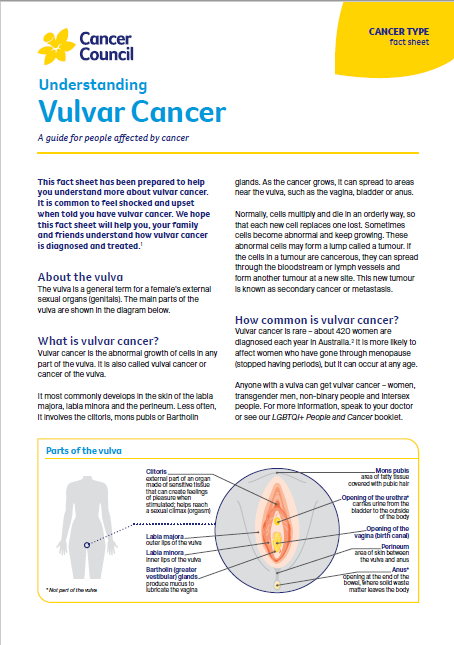- Home
- Vulvar cancer
- Diagnosis
- Your health care team
Your health care team
Your GP will arrange the first tests to assess your symptoms. If these tests do not rule out cancer, you will usually be referred to a specialist, such as a gynaecologist or gynaecological oncologist. The specialist will arrange further tests.
If vulvar cancer is diagnosed, the specialist will consider treatment options. Often these will be discussed with other health professionals at what is known as a multidisciplinary team (MDT) meeting. During and after treatment, you will see a range of health professionals who specialise in different aspects of your care.
Because vulvar cancer is rare, it is recommended that you are treated in a specialist centre for gynaecological cancer. Call Cancer Council 13 11 20 for more information and to ask about patient travel assistance that may be available.
To find cancer specialists, multidisciplinary teams and hospitals in NSW or ACT, you can visit the NSW Government website CanRefer.
Health professionals you may see
| GP | assists you with treatment decisions; works in partnership with your specialists in providing ongoing care |
| gynaecologist | specialises in diseases of the female reproductive system; may diagnose vulvar or vaginal cancer and then refer you to a gynaecological oncologist |
| gynaecological oncologist | diagnoses and performs surgery for cancers of the female reproductive system (gynaecological cancers), such as vulvar and vaginal cancers |
| radiation oncologist | treats cancer by prescribing and overseeing a course of radiation therapy |
| medical oncologist | treats cancer with drug therapies such as chemotherapy, targeted therapy and immunotherapy |
| reconstructive/ plastic surgeon | performs surgery that restores, repairs or reconstructs the appearance and function of the genitals after the cancer is removed |
| nurse | administers drugs and provides care, information and support throughout treatment |
| cancer care coordinator | coordinates your care, liaises with other members of the MDT and supports you and your family throughout treatment; care may also be coordinated by a clinical nurse consultant (CNC) or clinical nurse specialist (CNS) |
| psychiatrist, psychologist, counsellor | helps you manage your emotional response to diagnosis and treatment; may also help with emotional issues affecting sexuality |
| social worker | links you to support services and helps you with emotional, practical and financial issues |
| dietitian | helps with nutrition concerns and recommends changes to diet during treatment and recovery |
| women’s health physiotherapist | treats physical problems associated with treatment for gynaecological cancers, such as bladder and bowel issues, sexual issues and pelvic pain |
→ READ MORE: Vulvar cancer treatment
More resources
Prof Alison Brand AM, Director, Gynaecological Oncology, Westmead Hospital, NSW; Kim Hobbs, Clinical Specialist Social Worker, Gynaecological Cancer, Westmead Hospital, NSW; Dr Ming-Yin Lin, Radiation Oncologist, Peter MacCallum Cancer Centre, VIC; Dr Lisa Mackenzie, Clinical Psychologist Registrar, HNE Centre for Gynaecological Cancer, Hunter New England Local Health District, NSW; Anne Mellon, CNC – Gynaecological Oncology, HNE Centre for Gynaecological Cancer, Hunter New England Local Health District, NSW; A/Prof Tarek Meniawy, Medical Oncologist, Sir Charles Gairdner Hospital and The University of Western Australia, WA; Dr Archana Rao, Gynaecological Oncologist, Senior Staff Specialist, Royal Brisbane and Women’s Hospital, QLD; Tara Redemski, Senior Physiotherapist – Cancer and Blood Disorders, Gold Coast University Hospital, QLD; Anita Tyrrell, Consumer; Maria Veale, 13 11 20 Consultant, Cancer Council QLD.
View the Cancer Council NSW editorial policy.
View all publications or call 13 11 20 for free printed copies.
Need to talk?
Support services
Coping with cancer?
Speak to a health professional or to someone who has been there, or find a support group or forum
Need legal and financial assistance?
Pro bono services, financial and legal assistance, and no interest loans
Cancer information
Patient rights and responsibilities
What you can reasonably expect from your health care providers
Resource hub
Guides, fact sheets, videos, podcasts and more for people with cancer, their families and friends

